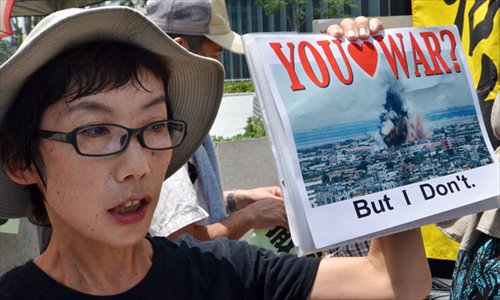Abe request for meeting ‘insincere’
Tokyo must take concrete action to improve ties: expert

A protester holds a placard and shouts slogans during a rally near the parliament building in Tokyo on Monday to protest against the Abe administration's recent lifting of the ban on collective self-defense. Photo: AFP
Japanese Prime Minister Shinzo Abe exhibited only "fake sincerity" by proposing a meeting with Chinese President Xi Jinping on the sidelines of an APEC meeting in November, said analysts, who noted that such talks will not take place unless Tokyo takes real steps to solve disputes.
Abe on Monday called for meetings with Xi during the regional meeting in Beijing to improve relations that have been overshadowed by territorial and security disputes, the second such request in July following a similar suggestion by Japan's Chief Cabinet Secretary Yoshihide Suga on July 9.
"I'd like to improve ties between the two countries, returning to the basics of making the relationship strategically mutually beneficial," Abe was quoted as saying at a session of the House of Representatives Budget Committee by Kyodo News. "I hope to have a summit meeting during the APEC conference."
Abe has yet to hold any official talks with Xi since he took office in late 2012, due to territorial disputes over the Diaoyu Islands in the East China Sea and his visit to the Yasukuni Shrine, a symbol of Japan's militarism honoring men convicted as Class-A war criminals following WWII, last December.
In contrast, Xi and South Korea's President Park Geun-hye have paid each other's country state visits and held five rounds of talks.
"My door is always open for dialogue. I urge China to take the same stance," Abe added in his request.
China's foreign ministry has yet to respond to Abe's proposal, but the ministry's spokesperson Qin Gang on Friday used a popular saying in China to comment on Suga's call for the summit, "If you are not sincere enough, you should not approach us."
"If Japan refuses to correct its attitude and take concrete actions, there is no way for China and Japan to improve relations," Qin added.
"Solving the Diaoyu dispute and displaying a correct attitude toward war history are the two major issues Japan needs to address before opening the door for dialogue," Liu Jiangyong, a vice-dean of the Institute of Modern International Relations at Tsinghua University, told the Global Times.
In an interview with the Japanese Mainichi Shimbun daily published Monday, Abe declined to rule out another visit to the shrine on the August 15 anniversary of Japan's defeat in WWII.
Abe also brushed off reports that Masahiko Komura, vice president of Abe's Liberal Democratic Party and former foreign minister, had said Abe would not visit the shrine again during a meeting with China's top legislator Zhang Dejiang in May in Beijing.
"That's Mr Komura's view and I'm not well aware of it," Abe told the paper.
Gao Hong, a deputy director of the Institute of Japanese Studies at the Chinese Academy of Social Sciences, doubted Japan's stance. "It is insincere for Japan to raise such a request [for a meeting] while continuing to defame China and empowering its military, which will not help with the situation," he noted.
Liu, the Tsinghua University vice-dean, believed Abe is only faking the move to create an illusion of improving international relations amid slipping popularity within Japan since his decision to end the country's ban on "collective self-defense" on July 1.
Abe's cabinet has experienced the first major backlash since the lift as Takashi Koyari, a candidate backed by Abe's ruling coalition, lost the first local election in July in Shiga prefecture, reported the Japan Times on Monday.
On Monday, about 400 Japanese demonstrators in Tokyo gathered to continue their protests against the end of the ban on collective self-defense at Japan's Diet building as the Japanese parliament kicked off a special session targeting Abe's Cabinet decision to reinterpret the pacifist Constitution, the Xinhua News Agency reported.
"[With his invitation,] Abe is only 'passing the ball' to China by showing fake willingness to improve relations to the international community, while he knows very well that China will not accept the request with unsolved problems," noted Liu.